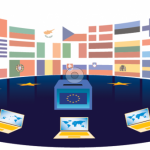
Opinion
A Gaming Revolution for International Development
There are more than one billion people living under $1.25 a day and almost the same number playing at least one hour of video games worldwide. So, how can the popularity of games be harnessed for positive social change?
21 March 2017

Global Risk: the Wildfire in the Commons
What distinguishes many of today's problems from those faced by former generations? The interconnected nature of global issues like emerging bio-technologies and climate change raises the possibility of 'wildfire risks', where the actions of one can have a great impact on many.
24 June 2015

Imagine a future dominated by brain emulation robots
History took us from the age of foraging to the age of farming, will brain emulation technology now take us from the industrial era to the age of the "em" economy?
22 June 2015

The Trans Pacific Partnership: Trade and Globalisation
Shrouded in secrecy, and acting outside established international channels for trade negotiation, will the Trans Pacific Partnership further marginalise smaller and less developed nations in their quest to secure a place in the global marketplace?
22 June 2015

Investing in institutional ‘software’
Building resilience to extreme weather needs a systems approach, including institutional ‘software’ as well as technical, financial, and physical infrastructure – or ‘hardware’.
12 May 2015

Advancing Health Research Through Online Social Networking
The recent explosion of internet-based communication and education tools has enabled medical practitioners and researchers to interact with patients in new and innovative ways.
1 June 2014

Engaging Digital Citizens for Children’s Rights
Never before has there been such a rich opportunity to engage the world’s digital citizens, including a newly empowered youth, in issues surrounding children’s rights and well-being.
1 June 2014

The Virtual Drive
Augmented Reality (AR) has significant economic potential because it embeds virtual objects into physical reality at negligible marginal costs, while maintaining targeted advertising capabilities similar to those of the internet.
1 June 2014

Identity: Who Do You Think You Are?
By 2020, it is predicted that networked devices, streaming information and connecting us globally, will exceed 50 billion. But will we be able to switch off, or maintain distinct identities in online and offline worlds?
1 June 2014

Liquid Democracy: New Politics in a Connected World
What forms the basis of an emerging form of technological movement, such as that seen in Egypt and Brazil, and how might it be used to bring about a new political revolution?
1 October 2013

Digital Platforms and E-Bureaucracy in Participative Democracy
In times of widespread access to high speed internet and social media, one would expect that it is easy to reach out to millions of people and encourage them to participate in direct democracy – but experience so far has proven the contrary.
1 October 2013

Opinion
The World Needs Science and Science Needs Women
With research showing that a mere 32 per cent of employed scientists and engineers are women, the challenge lies in being able to retain female scientific talent and encouraging a higher level of participation beyond school and into the workplace.
1 May 2013






